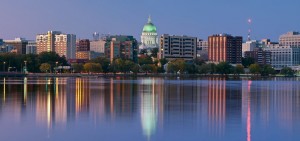Madison Makes Atheists Feel Welcome

With all of the recent hullaballoo in Arkansas and Indiana about laws which may allow for discrimination based on religious beliefs against LGBTQ Americans, it’s easy to think that our country is sliding backwards in the battle against prejudice. Statements made by local business owners that were supportive of the bill often showed that the ugliest prejudices are still held by many Americans, even though popular support of marginalized communities has largely been on the rise.
Thankfully, a new government action in Wisconsin seems to be turning the tide against government sanctioned religiously based discrimination towards atheists. The Madison city council recently voted to add atheists to the list of protected classes which cannot be discriminated against with regard to employment, housing, and public accommodations. The sponsor of this action, Alderwoman Anita Weier, even went as far as to say: “This is important because I believe it is only fair that if we protect religion, in all its varieties, we should also protect non-religion from discrimination. It’s only fair.”
This is a significant action by the city council, as American nontheists are subject to various forms of discrimination which isolate them from their local community and even disenfranchise them from the political process. As Laurie Goodstein of the New York Times reported in December 2014, “Maryland and six other states still have articles in their constitutions saying people who do not believe in God are not eligible to hold public office.”
While these laws are unenforceable in modern times, they are symptomatic of the persistent bigotry atheists face, both from society and from government institutions. In fact, only 40% of Americans stated that they felt positively about atheists, and the majority of Americans wouldn’t vote for an otherwise qualified atheist presidential candidate. And while American bias against atheists is largely nonviolent, atheists who live abroad are often in constant fear of their life because of their views.
As twenty states already have similar religious freedom laws to the ones in Indiana and Arkansas, with twelve more similar laws pending in various states around the country, actions that seek to include all Americans in our society are all the more appreciated and necessary. Religious individuals certainly should not feel that their faith or its practices are under “attack,” but neither should they feel as though they have a right to behave badly towards their fellow human beings because they think their religion tells them to do so.
America’s diversity and religious plurality are some of the main reasons why our country is able to attract talent from around the world, but if we begin to destroy these foundational principles we could soon find ourselves living through one of the most destructive “brain drains” ever witnessed. Rather than excluding our fellow citizens based upon who they are, what they believe in, or who they love, government institutions at the federal, state, and local level should be working towards passing measures which decrease tensions between communities and allow all Americans to feel comfortable in their own skin.
